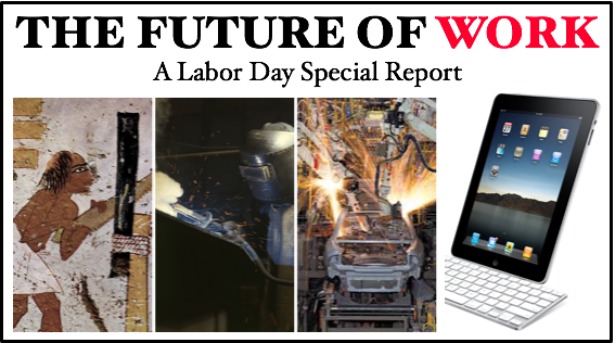The Freelance Surge Is the Industrial Revolution of Our Time
Welcome to the Gig Life. The boom in independent work is changing the way we think about jobs and careers. Does Washington get it?

REUTERS
It's been called the Gig Economy, Freelance Nation, the Rise of the Creative Class, and the e-conomy, with the "e" standing for electronic, entrepreneurial, or perhaps eclectic. Everywhere we look, we can see the U.S. workforce undergoing a massive change. No longer do we work at the same company for 25 years, waiting for the gold watch, expecting the benefits and security that come with full-time employment. We're no longer simply lawyers, or photographers, or writers. Instead, we're part-time lawyers-cum- amateur photographers who write on the side.
Today, careers consist of piecing together various types of work, juggling multiple clients, learning to be marketing and accounting experts, and creating offices in bedrooms/coffee shops/coworking spaces. Independent workers abound. We call them freelancers, contractors, sole proprietors, consultants, temps, and the self-employed.
And, perhaps most surprisingly, many of them love it.
This transition is nothing less than a revolution. We haven't seen a shift in the workforce this significant in almost 100 years when we transitioned from an agricultural to an industrial economy. Now, employees are leaving the traditional workplace and opting to piece together a professional life on their own. As of 2005, one-third of our workforce participated in this "freelance economy." Data show that number has only increased over the past six years. Entrepreneurial activity in 2009 was at its highest level in 14 years, online freelance job postings skyrocketed in 2010, and companies are increasingly outsourcing work. While the economy has unwillingly pushed some people into independent work, many have chosen it because of greater flexibility that lets them skip the dreary office environment and focus on more personally fulfilling projects.
Over the coming weeks, I will be writing about this profound shift and the three major trends that are central to it. These trends will have an enormous impact on our economy and our society:
1) We don't actually know the true composition of the new workforce. After 2005, the government stopped counting independent workers in a meaningful and accurate way. Studies have shown that the independent workforce has grown and changed significantly since then, but the government hasn't substantiated those results with a new, official count. Washington can't fix what it can't count. Since policies and budget decisions are based on data, freelancers are not being taken into account as a viable, critical component of the U.S. workforce. We're not acknowledging their prevalence and economic contributions, let alone addressing the myriad challenges they face.
2) Jobs no longer provide the protections and security that workers used to expect. The basics such as health insurance, protection from unpaid wages, a retirement plan, and unemployment insurance are out of reach for one-third of working Americans. Independent workers are forced to seek them elsewhere, and if they can't find or afford them, then they go without. Our current support system is based on a traditional employment model, where one worker must be tethered to one employer to receive those benefits. Given that fewer and fewer of us are working this way, it's time to build a new support system that allows for the flexible and mobile way that people are working.
3) This new, changing workforce needs to build economic security in profoundly new ways. For the new workforce, the New Deal is irrelevant. When it was passed in the 1930s, the New Deal provided workers with important protections and benefits but those securities were built for a traditional employer-employee relationship. The New Deal has not evolved to include independent workers: no unemployment during lean times; no protections from age, race, and gender discrimination; no enforcement from the Department of Labor when employers don't pay; and the list goes on.
The solution will rest with our ability to form networks for exchange and to create political power. I call this "new mutualism ." You will be reading more about this idea in subsequent articles from me next week, as I believe that new mutualism will be at the core of the new social support system that we need to build for the new workforce.
><

